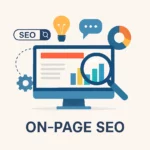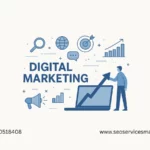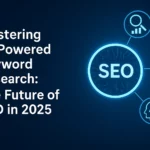In today’s competitive digital landscape, content marketing strategies for businesses have become essential for driving engagement, building brand authority, and generating leads. Companies that invest in high-quality, strategic content marketing see a significant increase in customer retention, website traffic, and conversion rates. In this article, we will explore the critical role content marketing plays in modern business and how organizations can leverage it effectively to stay ahead in the market.
Why Content Marketing is Essential for Businesses
1. Enhancing Brand Awareness and Authority
One of the primary goals of content marketing is to establish a strong brand presence. By consistently publishing informative and engaging content, businesses can position themselves as industry leaders. High-quality articles, blog posts, videos, and infographics help build credibility and trust among consumers, making them more likely to choose your brand over competitors.
2. Driving Organic Traffic and SEO Benefits
Search engines prioritize websites that regularly produce valuable content. Content marketing strategies for businesses include optimizing articles for SEO, using relevant keywords, and ensuring readability to improve search rankings. A well-structured content plan enhances visibility, attracts organic traffic, and increases the chances of appearing in top search engine results.
3. Generating Leads and Conversions
Effective content marketing guides potential customers through the sales funnel. By offering insightful content such as whitepapers, eBooks, and case studies, businesses can capture leads and nurture them into paying customers. A strategic mix of educational and promotional content helps boost conversion rates and maximize ROI.
Key Content Marketing Strategies for Businesses
1. Understanding Your Target Audience
A successful content marketing strategy begins with identifying and understanding your target audience. Businesses must analyze customer demographics, interests, and pain points to create personalized content that resonates with their audience. Utilizing data-driven insights ensures that content remains relevant and engaging.
2. Creating High-Quality, Valuable Content
Content quality is the cornerstone of an effective marketing strategy. Businesses should focus on producing well-researched, informative, and engaging content. Whether it’s blog posts, videos, podcasts, or social media updates, every piece of content should provide value to the audience.
3. Leveraging Multiple Content Formats
Modern consumers engage with content in various formats. To maximize reach, businesses should diversify their content marketing efforts by incorporating blogs, infographics, videos, webinars, and interactive content. A multi-channel approach ensures wider audience engagement.
4. Consistency and Content Calendar Planning
Consistency is key to content marketing success. Developing a content calendar helps businesses plan and schedule their posts efficiently. Regular updates keep audiences engaged and help maintain a steady flow of traffic to the website.
5. Utilizing Social Media for Content Distribution
Social media platforms play a crucial role in content distribution. Sharing content on platforms like Facebook, LinkedIn, Instagram, and Twitter increases visibility and encourages audience interaction. Engaging with followers through comments, shares, and discussions strengthens brand relationships.
6. Implementing Email Marketing Campaigns
Email marketing remains a powerful tool for distributing content directly to subscribers. Sending personalized newsletters, exclusive insights, and promotional offers keeps the audience informed and engaged while driving conversions.
7. Measuring and Analyzing Performance
Tracking content performance is essential to refining marketing strategies. Businesses should use analytics tools to monitor key metrics such as website traffic, bounce rates, engagement levels, and conversion rates. Regular analysis helps optimize content efforts for better results.
Common Challenges in Content Marketing and How to Overcome Them
1. Creating Engaging and Unique Content
With the vast amount of content available online, standing out can be challenging. Businesses should focus on delivering unique insights, storytelling, and interactive elements to captivate their audience.
2. Maintaining Consistency
Many businesses struggle with maintaining a consistent content schedule. Setting up an editorial calendar and outsourcing content creation to professional writers or agencies can help maintain regular output.
3. Adapting to Changing Trends
Content marketing trends evolve constantly. Keeping up with the latest trends, such as AI-driven content creation, voice search optimization, and short-form video content, ensures that businesses stay relevant and competitive.
FAQs on Content Marketing Strategies for Businesses
1. What is the most effective type of content for business marketing?
The most effective type of content depends on the target audience and industry. Blogs, videos, infographics, case studies, and social media posts are all highly effective in engaging customers and driving conversions.
2. How often should a business publish new content?
Businesses should aim to publish fresh content at least once a week to maintain engagement and improve SEO rankings. However, quality should always take precedence over quantity.
3. How can businesses measure content marketing success?
Success can be measured using key performance indicators (KPIs) such as website traffic, social media engagement, lead generation, conversion rates, and customer retention.
4. What role does SEO play in content marketing?
SEO plays a critical role in content marketing by ensuring that content ranks well on search engines. Using relevant keywords, optimizing meta descriptions, and improving website structure help boost organic traffic.
5. Can small businesses benefit from content marketing?
Absolutely! Small businesses can leverage content marketing to build brand awareness, attract new customers, and compete with larger companies by providing valuable and informative content to their audience.
Conclusion
Content marketing is an indispensable strategy for businesses looking to grow their online presence, engage customers, and drive sales. By implementing well-planned content marketing strategies for businesses, organizations can enhance brand authority, increase website traffic, and generate valuable leads. Investing in high-quality content creation, distribution, and performance tracking ensures long-term success in the digital landscape.











